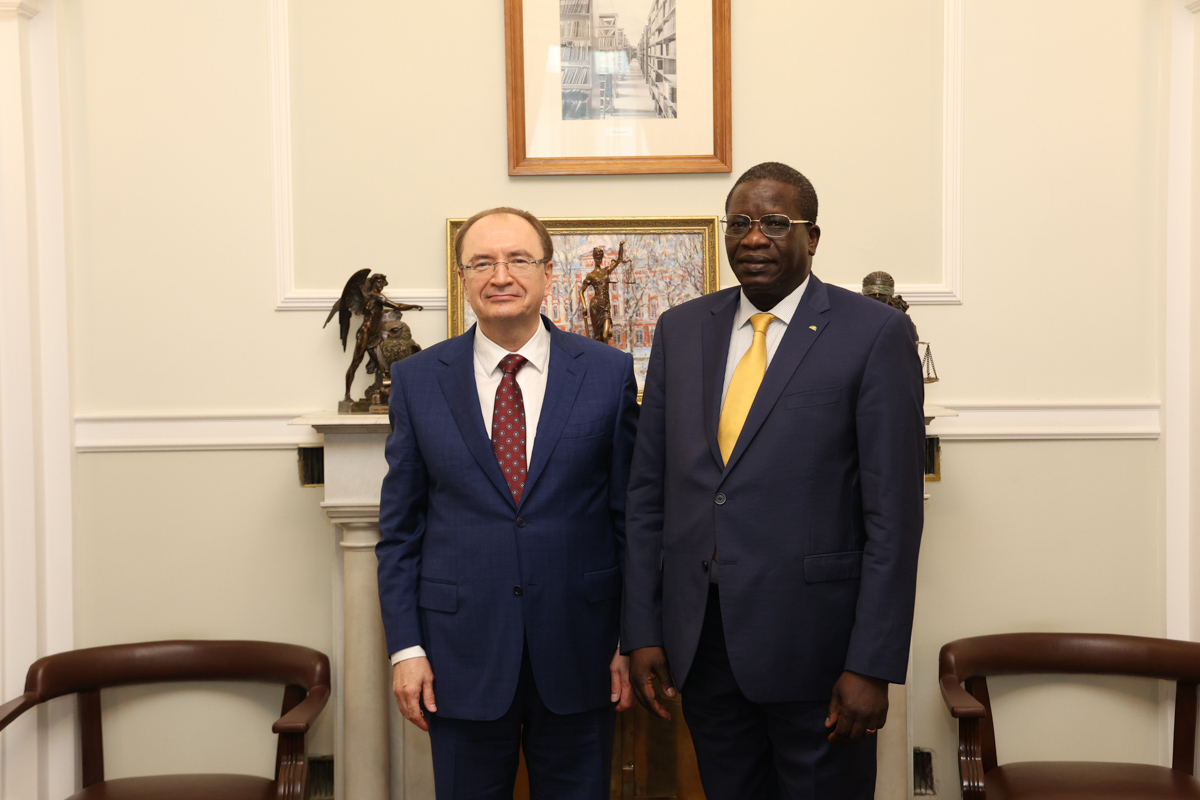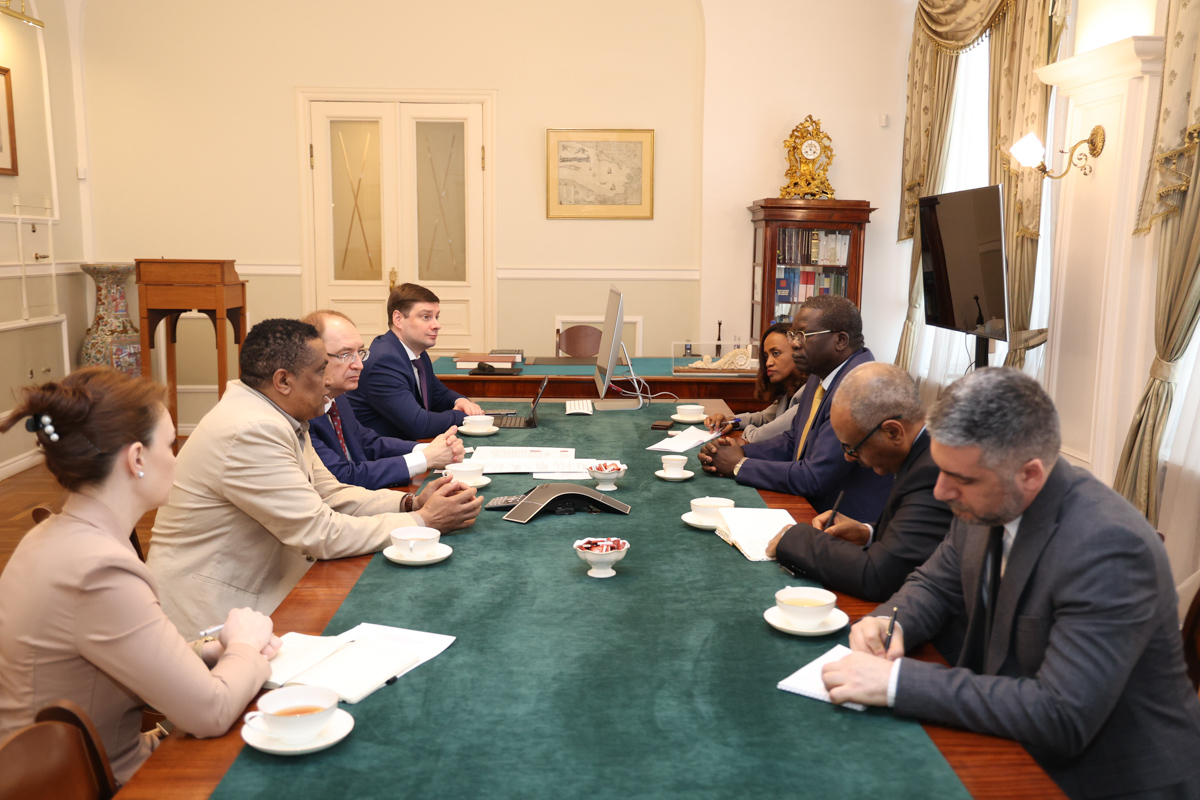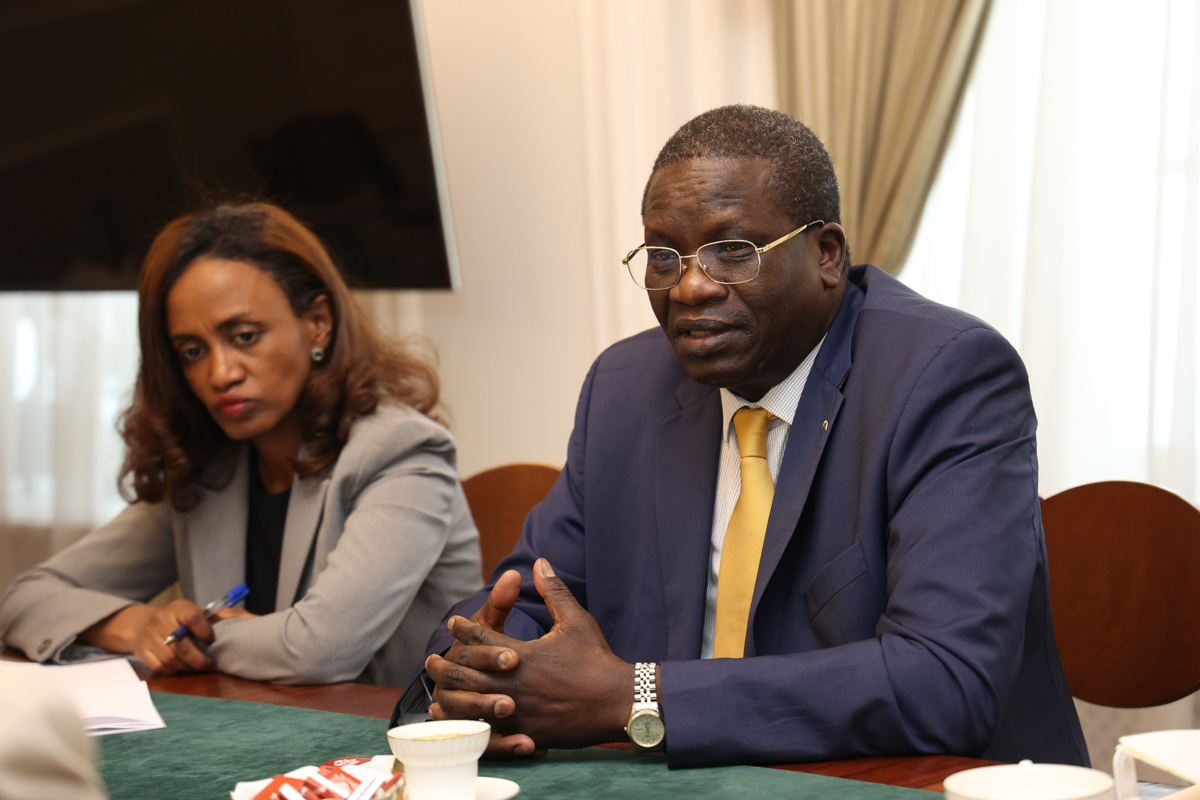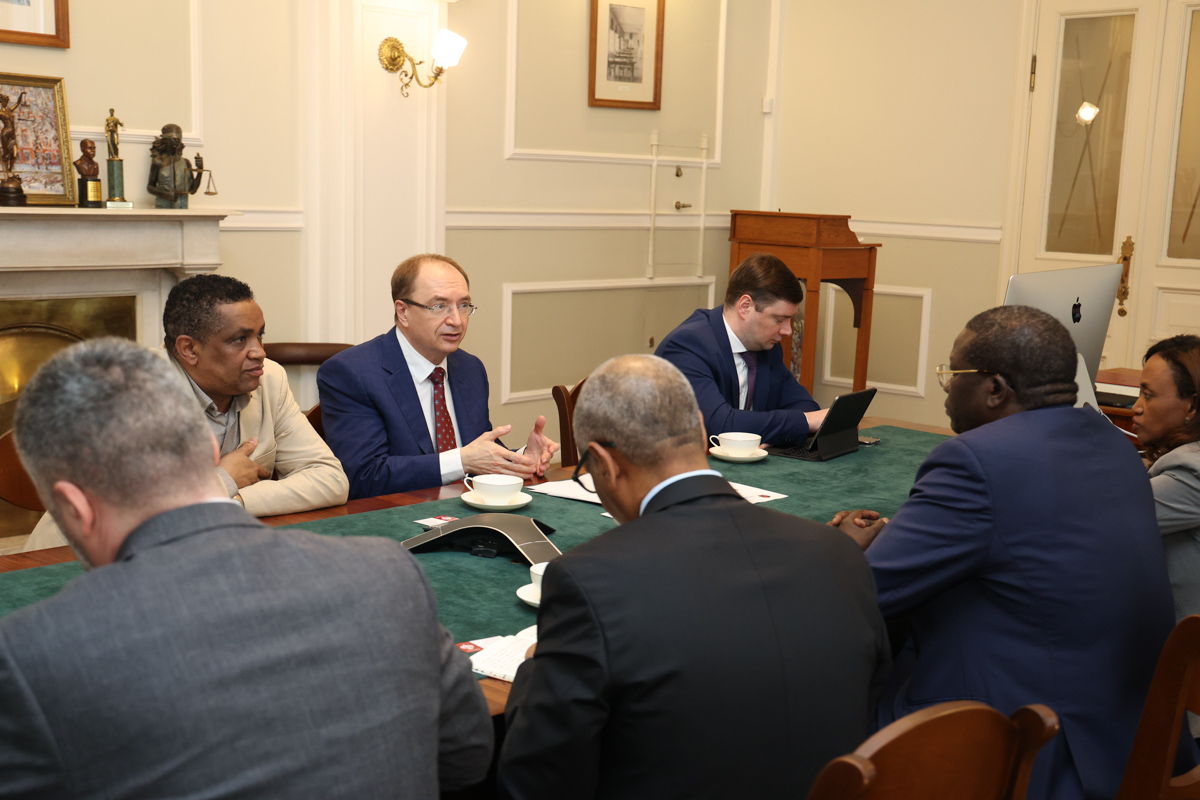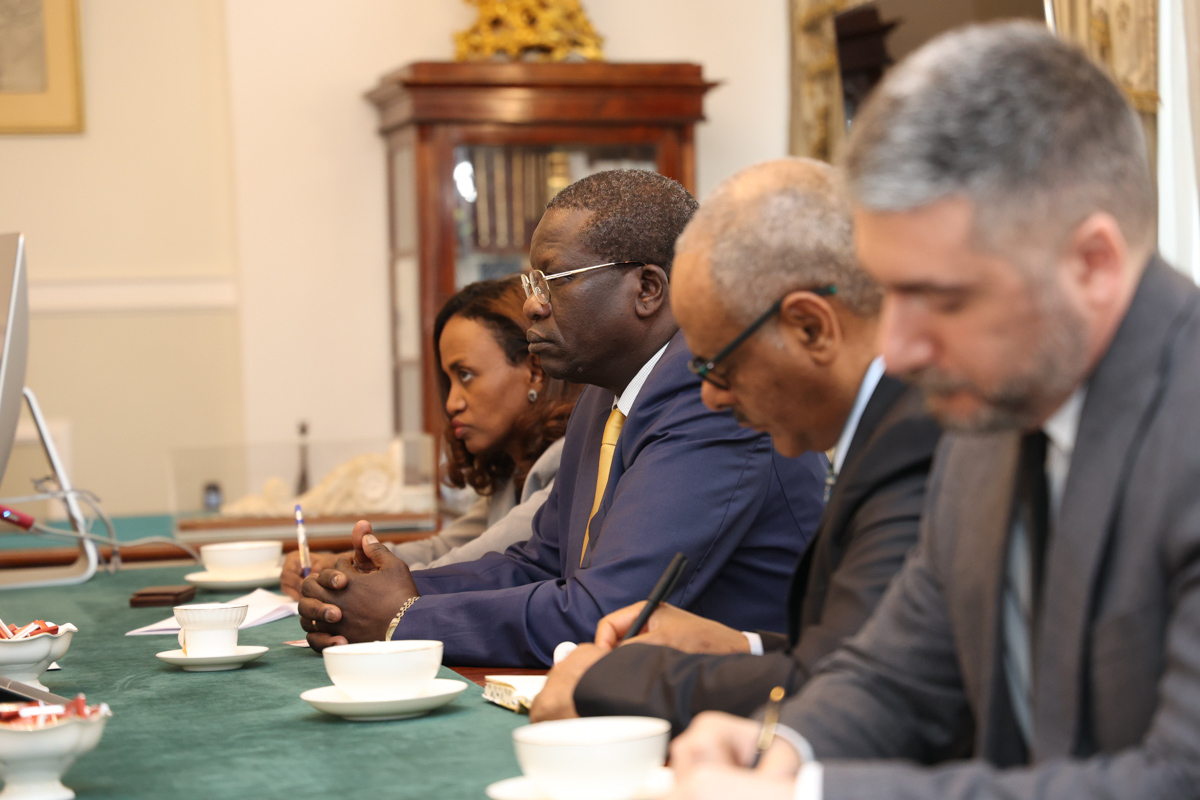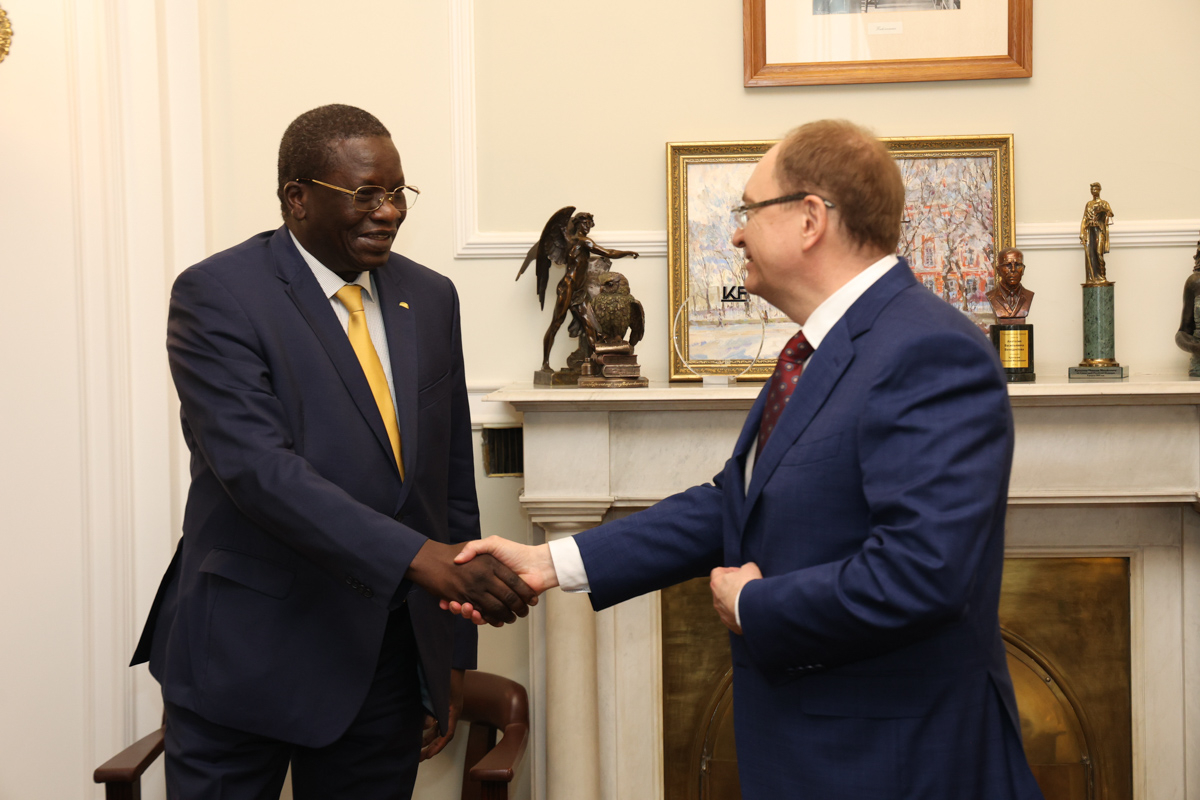St Petersburg University strengthens cooperation with Ethiopia
Cham Ugala Uriat, Ambassador Extraordinary and Plenipotentiary of the Federal Democratic Republic of Ethiopia to the Russian Federation, has visited St Petersburg University. During the meeting, the parties discussed opportunities for academic partnerships and collaborations and student exchange.
Welcoming the guests, Nikolay Kropachev, Rector of St Petersburg University, Corresponding Member of the Russian Academy of Sciences, said that St Petersburg University is actively developing cooperation with foreign educational institutions. The University opens representative offices and branches in partner countries and provide assistance in the development of regions. Nikolay Kropachev particularly focused on the need to organise student and professorial exchanges with universities of the Republic of Ethiopia.
According to Nikolay Kropachev, the University staff has a wide variety of competencies. At the University, natural sciences, social sciences, and humanities are studied at a high-quality level and over 120 world languages are taught, including the state language of Ethiopia.
St Petersburg University is popular among international partners and students. Every year, applications for study are submitted from more than 120 countries. We would like to use our potential to benefit Ethiopia—Russia cooperation.
Nikolay Kropachev, Rector of St Petersburg University
Nikolay Kropachev also mentioned that St Petersburg University has a special status, which allows it to sign direct cooperation agreements with ministries and other government agencies. This opens up more opportunities to ensure closer and more effective collaboration. In this regard, the Rector of St Petersburg University asked Mr Cham Ugala Uriat to provide assistance in establishing contacts with relevant ministries and departments of Ethiopia for the implementation of joint projects and initiatives.
The Ambassador Extraordinary and Plenipotentiary thanked his Russian colleagues for the warm welcome and expressed confidence that his visit to St Petersburg University will mark the beginning of fruitful cooperation. "You have a rich tradition of education, and we would like to exchange experiences and jointly develop the younger generation. We support your proposals and are ready to prepare relevant requests," said Mr Cham Ugala Uriat.
During the meeting, the parties discussed one of the possible areas of cooperation in the field of distance learning, i.e. joint online courses with universities in Ethiopia, which will contribute to the development of intercultural dialogue and mutual understanding between students and lecturers of both countries. St Petersburg University ranks first in the number of courses on the national platform Open Education. There are more than 3.5 million students. The online courses from St Petersburg University are available on foreign platforms ICE Institute in Indonesia and XuetangX in China.
The Rector of St Petersburg University also said that St Petersburg University has centres for non-degree programmes in the Russian language, operating in 50 countries around the world, including at least 10 African countries. The University also develops online courses for international students to freely use the language to interact with Russian colleagues. To make training more accessible and effective for students from different parts of the world, the University offers these courses in the national language of the partner country. The University also trains lecturers to improve their language proficiency.
Learning the language is the bridge that connects our peoples. When students and lecturers learn the language of the country we collaborate with, they obtain new knowledge and show a sincere desire to understand and respect the culture and traditions of that country. We are convinced that in this way we are making the foundation for long-term and successful cooperation in various fields.
Nikolay Kropachev, Rector of St Petersburg University
There was emphasis placed on organising a meeting with representatives of Ethiopian private and public enterprises that operate in Russia and Russian companies operating in Ethiopia to find common ground regarding personnel needs for various industries, e.g. business and mining to name just a few. These enterprises will be able to set specific tasks for St Petersburg University to train specialists to ensure that the University can adapt its academic programmes to meet the needs of the labour market.
In response to the Rector’s proposal, the Ambassador expressed his readiness to provide assistance. He said that joint efforts in training high-calibre specialists will help achieve the country’s strategic development goals. "We fully support your initiatives and believe that every country should educate its citizens, who will then be able to improve many areas, such as the economy, diplomatic relations, politics and education. We develop when we invest in personal education and upbringing," said Mr Cham Ugala Uriat.
During the meeting, foreign colleagues were invited to get acquainted with the University’s scientific developments, which could bring tangible benefits to Ethiopia. One of the proposals was the opportunity to use regional assistance programmes: for example, logistics, control over the efficiency of work with scientific equipment and infrastructure, and assistance in the development of tourism, including tourism strategies for regional development.
They particularly focused on innovative solutions developed at the Distributed Ledger Technologies Centre at St Petersburg University. In particular, the Rector presented an alternative to the SWIFT system, based on the blockchain principle, where all participants are equal users of the system. "We are confident that our developments can be useful, and we hope that you will be interested in them. We are ready to actively cooperate and transfer our potential in the interests of the two countries," added Nikolay Kropachev.
At the end of the meeting, the parties agreed to determine a list of Ethiopian universities that would be interested in signing cooperation agreements with St Petersburg University. The Ambassador of Ethiopia promised to provide full support and assistance in establishing contacts with relevant educational institutions. He assured that he would make every effort to ensure prompt and effective interaction. "We agree to cooperate not only in the field of education, but also in other areas, such as tourism, economics, medicine and the introduction of innovative financial technologies. Your proposals are of great interest to our country," said the Ethiopian Ambassador.


